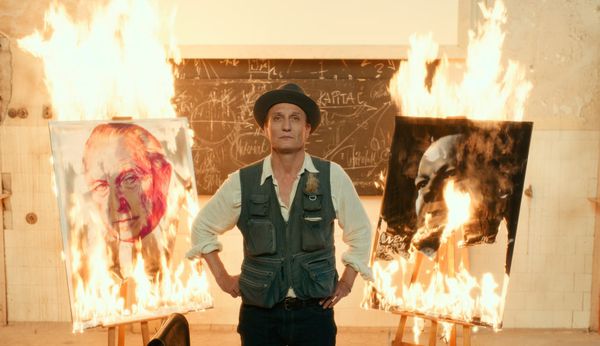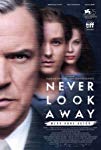Eye For Film >> Movies >> Never Look Away (2018) Film Review
Never Look Away
Reviewed by: Andrew Robertson

There's a frustration in the title of Never Look Away in that it is not a translation of its German title, Werk Ohne Autor, Work Without Author. The reason that it is frustrating is that few films invite reading through the lens of title as strongly as this one, through that designation. The film is the story of artist Kurt Barnert, a fictional East German whose artistic style and elements of life story are strongly influenced by the artistic style and life story of Gerhard Richter. The blurring of fictionalisation is just one of the layers that encourages contemplation almost deep enough to justify the film's expansive canvas. Florian Henckel von Donnersmarck's film bears the undeniable stamp of his own artistic vision, here writing, directing - a return to the control of The Lives Of Others unlike the intermittent and indelible oddity of The Tourist, a remake for hire that was not so much a work without author as a mystery by committee.
At 189 minutes this is Donnersmarck's longest film, an an astonishing and award-winning achievement for a third feature. Yet despite an occasionally icy remove its pace never feels glacial. Indeed, though it is by its nature episodic there is a consistency of vision that eventually becomes almost ironic. The detachment and frequently flattened effect finds final expression in Barnert's painted representations of photographs, these works described as 'without author' to give us the title. Before then, variously, there are murals, abortions, whitewashing, defections, felt, grease, time, space - the bombing of Dresden arrives as a noise (shades of Nico, 1988) but it is presaged by the dropping of thousands of small squares of foil - a countermeasure against radar, a blurring of vision known variously as chaff, Window, or Düppel - each of those effectively a way of seeing Never Look Away.

Chaff for that which is separated from wheat, the bit cropped away. Here we have a series of incidents in a life, from six and before the war through to not 30 and afterwards, a life that parallels and intersects with at least one other. Window, a way of seeing - something cut from something else for the purpose of observation, or at least the gap that allows it. Düppel, not 'doppel', though the homophonous accident is pleasing when I have been complaining about translation of title, and that near doubling of chaff again is in the fact that although this is not the life of Richter, but the painterly vision (DoP Caleb Deschanel helps produce a documentary feel) it's close enough that, edges blurred, they might overlap. I say 'complaining', but it is perhaps more observation, and, dispassionately, Never Look Away does not.
Not at moments of trauma, and there are plenty. Not at moments of violence, and there are enough in the transformation of Dresden to ruins that some almost seem cartoonish, so blunt and final are they in their impact. There are moments of edit and curation that become themselves acts of authorship, but though I and any number of others will attribute to director that which is a product of collegiate supervision, much of film is accident. This blur of focus here, this moment of performance there, and to attempt to attribute is to invite accident. Something the film itself does not absolutely - not here the process of discovery through metaphor that occurs in subjectively contemporary Castles In The Sky. Instead a different sort of clue, a string followed to reflect a style.
There are moments that overwhelm. Humour, the sound of horns, the premonitions brought about by a visit to an exhibition of art degenerate to the Nazis, the parallels of a slide of art differently degenerate to the Communist Party (including a second appearance at EIFF of Bacon's Three Studies For Figures At The Base Of A Crucifixion, also seen in Memory, that observation itself an accidental thematic link). There is an observation that something is "so beautiful it's almost Romantic" and that notion of a moment of beauty recalled at leisure is part and parcel. So too the strings that tie Barnert, unknowingly, to Dr Seeband (amongst other titles). Tom Schilling was perhaps more dissolute in A Coffee In Berlin as its protagonist Niko, but some aspect of him is considered sufficiently artistic that he is also (a) Brecht in Heinrich Breloer's film.
Sebastian Koch's CV includes a large number of doctors and roles with one name (including villanous ones like that in A Good Day To Die Hard) but here his identities are more complex, Herr Seeband is a man of many faces. Their points of intersection are two women - both Elizabeth. Saskia Rosendahl is young Kurt's aunt, 'Ellie', Paula Beer, Seeband's daughter. Across decades, borders, lines crossed and drawn, these four lives assemble and change each other in a spiral that is at once undeniably a product of Donnersmarck's intent but also bears the directionless happenstance of (a) real life. There are detours through bureaucracy, art, mental health, the processes of escape and abandonment, colouring within party lines and the delicacies of supervised courtship. However clinical proceedings appear they are also messily, abjectly, human - and all the more powerful for it.
Max Richter's score serves as a reminder that this is a film, even when it is drowned out by the horns of buses. There is a chilliness to proceedings not overshadowed by the overenthusiastic air conditioning at the screening Eye For Film attended, a saturation of sight and space and sound that captures and commands - that title is perhaps intended as an imperative. It is at times leisurely, almost into reverie, but it does not drift. The length of it will serve to put off many, but it does not over-use, over-stay - it invites even in moments of brush-stroke words like 'sweeping'. Yet in the march of history (and difficult history at that) it conjures a small human story from elements that will seem familiar. In that end however layered in artifice it may seem there is beneath it a perceptible truth, and a moving one at that.
Reviewed on: 05 Jul 2019
















